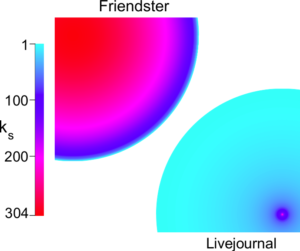David García, Pavlin Mavrodiev, Frank Schweitzer.
Proceedings of the 1st ACM Conference in Online Social Networks (COSN’13) 2013
Listed in MIT Technology Review Best of 2013
 We empirically analyze five online communities: Friendster, Livejournal, Facebook, Orkut, Myspace, to identify causes for the decline of social networks. We define social resilience as the ability of a community to withstand changes. We do not argue about the cause of such changes, but concentrate on their impact. Changes may cause users to leave, which may trigger further leaves of others who lost connection to their friends. This may lead to cascades of users leaving. A social network is said to be resilient if the size of such cascades can be limited. To quantify resilience, we use the k-core analysis, to identify subsets of the network in which all users have at least k friends. These connections generate benefits (b) for each user, which have to outweigh the costs (c) of being a member of the network. If this difference is not positive, users leave. After all cascades, the remaining network is the k-core of the original network determined by the cost-to-benefit c/b ratio. By analysing the cumulative distribution of k-cores we are able to calculate the number of users remaining in each community. This allows us to infer the impact of the c/b ratio on the resilience of these online communities. We find that the different online communities have different k-core distributions. Consequently, similar changes in the c/b ratio have a different impact on the amount of active users. As a case study, we focus on the evolution of Friendster. We identify time periods when new users entering the network observed an insufficient c/b ratio. This measure can be seen as a precursor of the later collapse of the community. Our analysis can be applied to estimate the impact of changes in the user interface, which may temporarily increase the c/b ratio, thus posing a threat for the community to shrink, or even to collapse.
We empirically analyze five online communities: Friendster, Livejournal, Facebook, Orkut, Myspace, to identify causes for the decline of social networks. We define social resilience as the ability of a community to withstand changes. We do not argue about the cause of such changes, but concentrate on their impact. Changes may cause users to leave, which may trigger further leaves of others who lost connection to their friends. This may lead to cascades of users leaving. A social network is said to be resilient if the size of such cascades can be limited. To quantify resilience, we use the k-core analysis, to identify subsets of the network in which all users have at least k friends. These connections generate benefits (b) for each user, which have to outweigh the costs (c) of being a member of the network. If this difference is not positive, users leave. After all cascades, the remaining network is the k-core of the original network determined by the cost-to-benefit c/b ratio. By analysing the cumulative distribution of k-cores we are able to calculate the number of users remaining in each community. This allows us to infer the impact of the c/b ratio on the resilience of these online communities. We find that the different online communities have different k-core distributions. Consequently, similar changes in the c/b ratio have a different impact on the amount of active users. As a case study, we focus on the evolution of Friendster. We identify time periods when new users entering the network observed an insufficient c/b ratio. This measure can be seen as a precursor of the later collapse of the community. Our analysis can be applied to estimate the impact of changes in the user interface, which may temporarily increase the c/b ratio, thus posing a threat for the community to shrink, or even to collapse.
Links
Selected Media Response
- Wired – The Friendster Autopsy: How a Social Network Dies
- MIT Technology Review Best of 2013 – An Autopsy of a Dead Social Network
- Slate – How will Facebook die?
- The Connectivist: The Rise and Fall of Websites
- Gizmondo – A Digital Autopsy: How Computer Scientists Analyzed Friendster’s Cause of Death
- NPR – The Life Cycle Of A Social Network: Keeping Friends In Times Of Change
- BBC radio
- The Guardian – Even Google won’t be around for ever, let alone Facebook
- 3SAT – Relaunch war das Aus
- Materia – Las lecciones que Facebook debe aprender de la muerte de la primera gran red social
- El Pais – ¿Hacia una era digital oscura?
- Mashable – How Twitter could still blow it and fade away into social network oblivion
- Al Jazeera Inside Story – Is Twitter still relevant?
- ZEIT WISSEN – Kann Facebook zugrunde gehen?